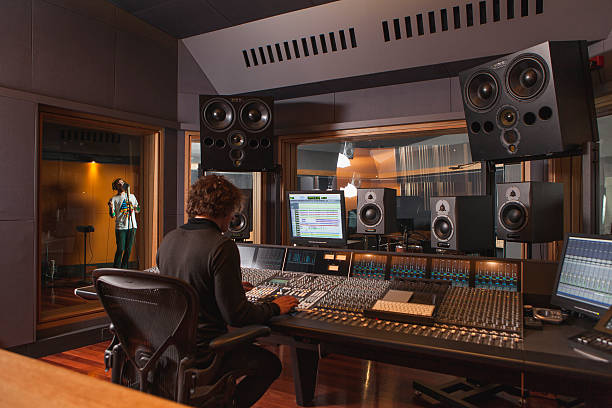Being a musician is a job like no other. Full of fun, excitement and new adventures. However, it’s not for everyone. It’s hard work and can be extremely tiring, mentally and physically. Many musicians even take on a music industry role until they can go full time with their passion to perform. Either way, there are so many roles out there, that there’s something for every music lover.

Music Producer
As a music producer you’ll be the creative connection between an artist and a record or label. Your responsibility will be to create an environment where creators can grow and strengthen their talents. They should be able to express themselves through their music and your responsibility is to encourage this. It is an excellent role for those who love creating music but don’t want to be a full time musician. You’ll have the balance of both the artist world and their connections. Your aim is to assist recording projects for each artist you work with. This goes more than just pressing record and leaving them to it. You’ll need to advise them on the materials they record onto, what equipment they’ll need, balancing their budgets to get the best sound at a cost they can handle and arranging mixes of sounds.

Requirements:
You should know about audio, the foundations of how sound is made up. Learn about music concepts and various genre styles. You might be presented with an artist’s work, and it’s a genre you’re not used to. This is why it’s important you’re varied in your styles. Don’t stick with one genre because it will limit your client base massively. If you want to be the best within your field, ensure you know about music mixing like the back of your hand. Artists will come to you for advice. If their track doesn’t quite sound right, they’ll want to know how they can fix it, so it’s important you can assist them. You need to be in the know, looking at other music producers and their work constantly. Make sure your knowledge base on popular albums, artists and tracks covers how they were produced and who by.
Sound Engineer
Sound engineers are responsible for capturing the sound and changing it. Within a studio setting, they’ll be altering your audio as it’s being recorded. They must have an ear for sounds as it’s their responsibility to get it right. Both analogue and digital audio are things you should know about, because you might find an artist that wants an older style of recording. You’ll need to be trained in different styles of technology to avoid limiting your client base. Everything from compressors, microphones to signal flow will all be things you must cover. After all, you are responsible for their sound, and it must be right. Any technical problems that crop up must be fixed, so you’ll need to know how.

Requirements:
You must be trained in various types of music techniques. Digital and analogue recordings must both be familiar to you and your file organisation must be immaculate to avoid losing any important files. You also need to be a problem solver, ready to take on and challenge any task. Keeping your name in people’s minds is something you shouldn’t be afraid to do. After all, a lot of your work will come from word of mouth. Speak to people and be confident, because it will work in your favour.
Music Teacher
When people think of teachers, they often think of the more academic subjects. However, we need music teachers. You could teach anywhere. At a school, privately or at a music centre. What you teach is also your choice. You might want to teach music as a whole. With this, you might decide to teach in schools where students have a set curriculum and learn about theory, history of music and then the practical elements. Or, you might decide you want to be in a school but only teaching singing classes or musical instruments. Many schools will allow extra curriculum activities where students can learn these things in their own time. Maybe you even want to be the teacher of a school choir, which could even go hand in hand with one of the other roles.
Teaching privately could be better for you. You set your hours and pricing and the students come to you to learn an instrument or to improve their singing. This will rely on your marketing skills. You must spread your name, so parents know about your services and can therefore sign their children up. Often you’ll have to work unsociable hours because the 9-5 won’t work around school times. However, if it’s something to add to your music career then why not. It might be you’re only doing it part time anyway. If it’s something you want to do but don’t know where to start, consider joining a music centre first as they’ll bring the clients to you instead of you searching for them.

Requirements:
It depends on where you want to teach. If you’re setting up your own business, you won’t typically need qualifications of any kind. They may however go in your favour. Parents may choose your services because you have the relevant experience. However, often, it will be word of mouth that gets your clients and your talent should speak for itself. You will need to be confident and a people person to be able to teach. If you’re considering working in a school though, it will depend on your location to what requirements you need. Often you will need some form of teaching qualification.
Booking Agent
Being a booking agent means getting a band or artist on stage. You’re responsible for organising their gigs and events. Meaning, if they aren’t performing, you’re not doing your job. You’ll need to ring around a lot of people and make the right connections in order to expand your network. The bigger your network, the more artists who will want to hire you because they know you’ll get them work. You must be an organised person because you’re in charge of all logistics. If your client lives one end of the country, and you want to book an event the other end – you’ll need to make it work. You’re in charge of sourcing venues, arranging deals and making sure equipment needed will be supplied. For this you’ll work closely with the touring manager or artist manager.

Requirements:
Being good with numbers would be really helpful in this role. A background in accounting, with a love for music could make this the career for you. You need to be self motivated and reliable. Having excellent time keeping and organisation skills is a must. Often you’ll be required to have qualifications of some kind, so you can show your skill set. You’ll need some form of training as you must know about contracts, negotiation, admin, copyright laws, marketing and events planning. It’s an all rounder that often gets overlooked.
A&R
This role requires talent hunting. It might be great if you’re an artist yourself, looking for other talents. You’ll know what it takes to be in the music industry as an artist, so you might know who will be able to keep up with that. Having a good ear for music will help make this job a lot easier. Many companies have talent scouts as part time positions. Meaning you can have a full time job and also have something running alongside within the music world. Or, you can balance your work and music life comfortably. Discovering new artists will be a fun adventure, you might learn a lot about yourself as a musician. Hearing new sounds and styles will keep things exciting. However, you’ll need to be someone who can be constructive.

Requirements:
The good thing about this role is, often you don’t need any experience. You’ll normally need a passion for music and the industry. You can start small and work your way up if desired. Often A&Rs will be at festivals and gigs scouting for the latest, fresh talent. You need to be confident enough to strike up conversations. If there are other agents around, why should the artist sign with your company? To start small you might work off a commission base, so you need to be someone who is willing to get what they want.
Social Media Marketer
This solely depends on the type of marketing you’re doing. You might be marketing a single artist, and they pay you directly to manage their emails and social platforms. Your job therefore would be to increase their sales and boost their name through the use of exciting social media posts. They’d be hiring you to take a stress off their hands and therefore would expect more views from your work. Alternatively, you could end up working for a marketing team. This could be a music company that cover various artist’s promotion, or perhaps a company that offer a service within an area of the industry. You might become part of the marketing team for a management company or distributors. Then, your role will be to market that company and what they offer, however it will still be within the music world.

Requirements:
You’ll need to be social media savvy. If you hate using social media platforms, then this job isn’t for you. Content creation will be a huge part of your job. If not your main responsibility. You will need to be able to create exciting posts that can be shared regularly across various platforms. That’s how the artist will be noticed, through your work. Being organised is a must because you will need to plan and schedule posts. Especially when an artist is going on tour or releasing a new album. If working for a company, you’ll probably require experience. A background or a qualification in social media marketing. There’s so much to learn, especially in the SEO world that often they won’t hire someone just because they enjoy social media.
Distribution
Work with the people that send music out to every streaming store. Our partners over at RouteNote offer free music distribution. Working in this world could offer so many jobs. You could be part of a team of moderators that listen to every artists tracks. They decide through following streaming platforms guidlines, what can and can’t be sent to stores. You’d need a good ear for music and to keep updated on copyright laws. Other roles you might decide to take on are things like customer support, helping answer any artists questions. Or, it might be that you want to be part of a licensing team. There are so many options you could take on if you decided to work with a distribution company. All are heavily involved with the music industry because they all come together to get music online.

Requirements:
For this role you might need expeirence depending on which route you go down. Each company will be different. Most may only require a passion for music. However, this will be a great place to network if you are a musician. You’ll be surrounded by fellow artists. Some companies will require music backgrounds with qualifications to support that. This is because you’re responsible for sending music to streaming stores. Sending the wrong things could result in the company being blocked by stores, or even, in copyright trouble.





